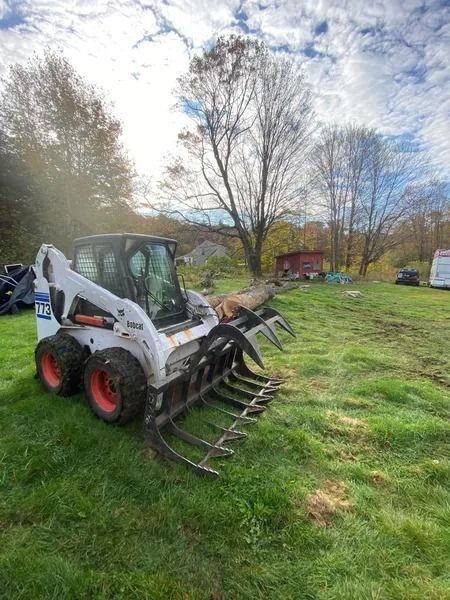Whole Home Generator
Raymond, NH
Free Estimates Within Three Business Days
Same-Day Emergency Services
Licensed and Insured
Request an Estimate
Hero Request Form
Thank you for contacting us.
We will get back to you as soon as possible.
Please try again later.
Generator Services
At Delano Property Services, we understand the importance of maintaining a reliable power supply for your home, especially during New Hampshire's unpredictable weather. Our comprehensive generator services ensure that you stay powered when it matters most. Whether you're looking to install a new whole home generator in Raymond, NH, require routine maintenance, or need emergency repairs, our team is equipped to handle all your needs.
We specialize in residential generator solutions, and our certified technicians provide expert installation, regular servicing, and swift repairs to keep your systems running smoothly. With over 20 years of experience, Delano Property Services is committed to delivering quality craftsmanship, transparent scheduling, and responsive customer support. Contact us today to ensure your property remains powered and protected. We're eager to install a
whole home generator in Raymond, NH or a nearby community that keeps your family comfortable in all conditions!
Why Choose Delano Property Services?
Over 20 Years of Experience
Same-Day Emergency Services
We Handle All Insurance Paperwork
Locally and Family-Owned
Responses in Two Hours
Transparent Project Scheduling
Free Estimates in Three Business Days
Licensed and Insured

Frequently Asked Questions
What is a standby generator and how does it work?
A standby generator is a backup power system designed to automatically provide electricity during a power outage. It connects to your home's electrical system and uses natural gas, propane, or diesel fuel to operate. When the utility power goes out, the whole home generator in Raymond, NH detects the outage and starts within seconds, supplying seamless electricity to critical systems. Standby generators ensure that essential appliances, heating or cooling systems, and electronics remain operational until power is restored.
Do I need a generator for my home?
Generators are beneficial for anyone who wants uninterrupted power during outages. Homes with medical equipment, heating and cooling systems, or refrigeration needs greatly benefit. Even in areas with relatively stable power, having a generator offers peace of mind and prevents disruptions caused by storms, accidents, or utility failures.
What size generator do I need?
Generator size depends on the electrical load you intend to power. Small units can run essential appliances like lights and a refrigerator, while larger systems can power entire homes. A professional assessment will calculate your total wattage requirements, ensuring your whole home generator in Raymond, NH can handle the necessary load without being oversized, which can be inefficient and costly.
What types of fuel can generators use?
Generators typically run on natural gas, propane, or diesel fuel. Natural gas is convenient and often supplied directly from utility lines, requiring no on-site storage. Propane is clean-burning and easy to store for emergencies. Diesel generators are durable and reliable for larger systems. Each fuel type has advantages and considerations, such as cost, availability, and storage requirements, which should be evaluated when choosing a generator.
How often should a generator be serviced?
Routine maintenance is crucial for generator reliability. Most generators require inspection and servicing at least once a year, including oil changes, filter replacements, battery checks, and overall system testing. Regular servicing ensures the generator will operate properly during an outage and extends the life of the equipment. Many manufacturers recommend additional seasonal checks depending on usage frequency and environmental conditions.
Can I install a generator myself?
Professional installation is highly recommended. Generators involve complex electrical connections and fuel system integration, which can be hazardous if improperly installed. Licensed technicians ensure that the whole home generator in Raymond, NH is safely connected to your electrical panel, follows local codes, and functions correctly. Professional installation also ensures that warranties remain valid and reduces the risk of costly mistakes.
How long will a generator run during an outage?
The runtime depends on the fuel type, generator size, and load. Natural gas and propane generators can run as long as fuel is available, often indefinitely for natural gas systems. Diesel generators typically have limited fuel tanks, so runtime may be a few hours to a day.
Are generators noisy?
Generators produce some noise due to the engine operation, but modern standby units are designed to be quieter. Noise levels vary by size and brand, with residential units typically quieter than larger commercial models. Sound-attenuating enclosures and strategic placement can further reduce noise impact. For residential areas, it’s important to follow manufacturer guidelines for placement to minimize disruption to your home and neighbors.
Can a generator run automatically during a power outage?
Yes, most standby generators are equipped with an automatic transfer switch (ATS) that detects power loss and starts the generator automatically. This ensures that electricity is restored to essential systems within seconds of an outage. The ATS also safely transfers the load back to utility power when it is restored and shuts down the generator, providing seamless operation without manual intervention.
How do I know if my generator is working properly?
Regular testing and monitoring are essential. Many generators include self-diagnostic systems that display operational status and alert you to potential issues. Manual testing, such as running the whole home generator in Raymond, NH under load periodically, ensures that it will function when needed. Professional inspections during routine maintenance also verify that the engine, fuel system, battery, and electrical connections are all in good working order.
What safety precautions should I take with a generator?
Safety is critical when using generators. Always operate a generator outdoors to prevent carbon monoxide buildup, ensure proper ventilation, and keep it away from windows or vents. Never plug a generator directly into a wall outlet without a transfer switch, as this can cause dangerous backfeed to utility lines. Store fuel safely and follow manufacturer guidelines for operation and maintenance to prevent accidents and property damage.
Can a generator power my entire home?
Depending on its size, a generator can power your entire property or just essential circuits. The whole home generator in Raymond, NH we offer is designed to handle full electrical loads, including HVAC systems, appliances, and lighting. Smaller units are ideal for emergency backup of critical systems only. A professional assessment helps determine which type and capacity best suits your property’s needs.
Can I use my generator during severe weather?
Yes, generators are designed to provide power during storms, snow, or other severe weather conditions. However, safety precautions must be followed, including placing the generator in a dry, ventilated area and securing fuel supplies. Regular maintenance ensures the generator is ready to operate under emergency conditions and provides reliable backup when utility power is unavailable.
How often should I test my generator?
Generators should be tested at least once a month to ensure proper operation. A short test run under load allows you to verify that the engine starts correctly, the transfer switch functions, and all connected systems receive power. Regular testing helps identify minor issues early, ensuring your whole home generator in Raymond, NH is ready during an actual power outage and prolonging the life of the system.
Can a generator run during a power surge or outage caused by lightning?
Generators can provide power during most outages, but lightning and severe electrical surges can damage sensitive equipment. Installing surge protection and grounding your generator properly reduces the risk of damage. While the generator will operate normally during typical outages, extra precautions are recommended during severe storms to protect both the generator and connected appliances.
Here's what our satisfied customers are saying...
At Delano Property Services, we take pride in providing exceptional HVAC, plumbing, roofing, tree care, and emergency services to our customers. We would be grateful if you could share your thoughts about our business with others. Your feedback helps us improve and helps others make informed decisions. Please take a moment to leave a review of Delano Property Services and let others know what you think.


